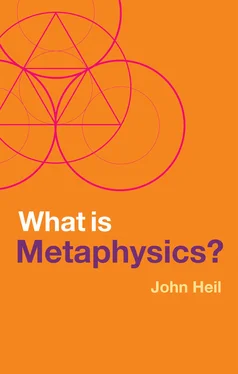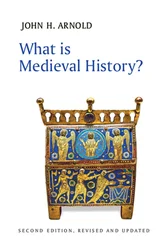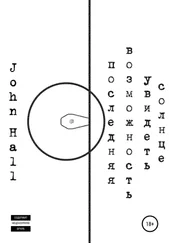A series and B series.J. M. E. McTaggart’s labels for two ways we have of ordering occurrences in time. The A series is indexical, agent-centered. Just as “here” refers to the current spatial location of the speaker, “today” refers to the speaker’s temporal location. Yesterday, today, and tomorrow belong to the A series. The B series locates occurrences in relation to one another in time, not relative to the speaker. Unlike something’s being here now, something’s occurring before, after, or simultaneous with another is eternally true, not indexed to the spatial and temporal location of the speaker. Four-dimensionalism.As used here, the phrase refers to conceptions as “spacelike,” a dimension in addition to the three spatial dimensions. An object persisting through time is extended both spatially and temporally. Temporal part.Used here to refer to an object at a time or over a stretch of time. You yesterday, you today, and you tomorrow are temporal parts of you in the way your left half and right half are spatial parts of you. On this conception of temporal parts, objects persisting over time are not made up of temporal parts. Objects’ temporal parts are ways of dividing up whole objects analogous to dividing Earth into Southern and Northern hemispheres. Thus conceived, spatial and temporal parts are not to be confused with the material occupants of a spatial region or temporal interval.
McTaggart’s “The Unreality of Time” ( Mind 17 [1908]: 457–74) introduced the A series and the B series. McTaggart was inspired by F. H. Bradley’s Appearance and Reality , which was originally published in 1893. A corrected edition appeared in 1930 (Oxford: Clarendon Press). Neither Bradley nor McTaggart is recommended for beginners.
D. C. Williams’ “The Myth of Passage” ( Journal of Philosophy 48 [1951]: 457–72) contains an accessible and influential discussion of the passage of time. Ambitious readers might look at Theodore Sider’s Four-Dimensionalism : An Ontology of Persistence and Time (Oxford: Oxford University Press, 2001).
My discussion does not come close to covering the extensive body of work on time. I omit discussion of the distinction between “3-dimensionalism” and “4-dimensionalism,” for instance. Katherine Hawley’s How Things Persist (Oxford: Oxford University Press, 2001) more than fills the gap. Storrs McCall, in A Model of the Universe (Oxford: Clarendon Press, 1994), defends an intermediate position according to which the universe is constantly expanding at the “leading edge” along a temporal dimension.
I have omitted, as well, a discussion of time travel. If you are interested, David Lewis’s “The Paradoxes of Time Travel,” in his Philosophical Papers , vol. 2 (Oxford: Oxford University Press, 1986) introduces the subject in an appealing way. Heather Dyke, in “The Metaphysics and Epistemology of Time Travel” ( Think 3 [2005]: 43–52), provides a compact, reader-friendly discussion.
Конец ознакомительного фрагмента.
Текст предоставлен ООО «ЛитРес».
Прочитайте эту книгу целиком, купив полную легальную версию на ЛитРес.
Безопасно оплатить книгу можно банковской картой Visa, MasterCard, Maestro, со счета мобильного телефона, с платежного терминала, в салоне МТС или Связной, через PayPal, WebMoney, Яндекс.Деньги, QIWI Кошелек, бонусными картами или другим удобным Вам способом.












